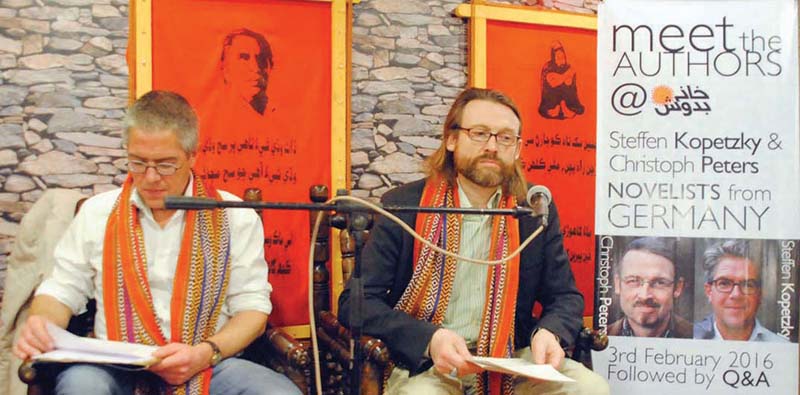
The Pakistanis, who continue to be haunted by the 'US-sponsored' Afghan Jihad against Russia, are au fait with the flip side of this otherwise noble religious deed. But for participants at a 'meet the authors' event, organised by Cafe Khanabadosh and the Goethe Institut on Wednesday, the German involvement in instigating a Muslim revolt under the cover of Jihad came as no less than a startling revelation.
The era was World War I when the Central Powers, led by Germany, were pitted against the UK, France and Russia. "The plan was for revolutionising the Muslim territories of our enemies [Muslim countries and India under colonial occupation]," said German author Steffen Kopetzky, as he read an excerpt from his recent historical novel 'Risiko' [Risk], in which he delineated his country's involvement in Jihad during WWI.
In the novel, the fictitious Sebastian Stichnote travels with the real Niedermayer-Henting expedition, which Germany sent to Afghanistan's ruler Emir Habibullah in 1915-16. The diplomatic mission tried to persuade the Emir to revolt against the British empire and incite turbulence in the Indian subcontinent, mainly among the Muslims, while allying with the German Reich and the Austro-Hungarian monarchy.
"The Islamic Jihad was a master plan of Max Von Oppenheim, a German aristocrat, adventurer and diplomat, who lived for decades in Muslim countries. He believed that a well-orchestrated campaign could agitate Muslims to rise against British and French colonialists from Africa to Asia," explained the author.
In 1914, German Kaiser Wilhelm II approved Oppenheim's plan, which aimed to use jihad as his country's secret weapon. "They [the diplomats] began to call the emperor as the Sultan of Germany to lure Muslims towards their country," Kopetzky said.
Subsequently, the Deutsche Bank was involved in the plan to funnel money, he added. "The Germans knew that the British had recruited 1.5 million Indians to fight for them in WWI. While the Central Powers were engaged in a war with the UK, France and Russia, they wanted to arouse a rebellion in their colonies and prevent more recruitment," he said.
The plan stirred up insurrection in many African and Asian countries. The author, however, was convinced that the global powers used religion for their interest. "The same is happening even today and we all know which two powerful countries are using Muslims for their own personal agendas."
Christoph Peters, the second German fiction writer, read an excerpt from his novel 'The Fabric of Night'. Set in Turkey, the story's protagonist Albin Kranz, a young sculptor, is witness to a murder but his companions distrust his account, believing him to be a debauched and hallucinatory individual.
Peters, who has authored seven novels, says he is influenced by the Sufi traditions of Islam. His other novel 'A Chamber in the House of War' is also set in a Muslim country; Egypt. According to Kopetzky, he first encountered the Muslim world while writing his 2005 travelogue 'Morocco'. His debut novel 'Hand Encyclopedia of Europe's Fundamental Problems at the End of 20th Century' was published in 1997. His 2015 novel 'Risiko' remained on the Spiegel bestseller list for 25 weeks.
Published in The Express Tribune, February 5th, 2016.
1732090022-0/Elmo-and-Amelia-(1)1732090022-0-405x300.webp)
1725523665-0/Minecraft-Movie-(1)1725523665-0-165x106.webp)

1732089759-0/BeFunky-collage-(75)1732089759-0-165x106.webp)

1732080054-1/Copy-of-Untitled-(48)1732080054-1-270x192.webp)











COMMENTS
Comments are moderated and generally will be posted if they are on-topic and not abusive.
For more information, please see our Comments FAQ